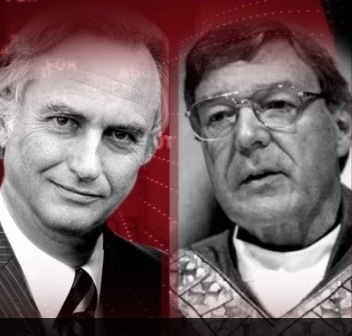It’s not as compelling as the debate itself of course, but the ensuing discussion about Monday’s Q & A is nonetheless quite interesting.
I made a rare visit to the Catholica forum board on Tuesday, to gauge the reaction of Catholics who don’t think like me. I didn’t perservere with the whole thread, but the first few posts credited Pell for not embarrassing the cause. In Catholica land, that’s high praise indeed!
In contrast, a similar discussion on Fr Z’s blog was critical of Pell, especially for his claims about Adam and Eve. Fr Z himself posted the video without comment, though he does defend the Cardinal’s claim that atheists can go to Heaven.
Andrew Bolt, as is his wont, turned to the data. In his blog on Tuesday, he awarded the debate to Pell, on the basis that Pell’s citations were vindicated, while Dawkins’ were not. Quadrant, too, refutes Dawkins’ assertion that Hitler was a Catholic.
In his newspaper column yesterday, Bolt (a self-described agnostic) developed Pell’s argument that Christianity restrains the pursuit of power while atheism gives it license. But he also unearthed an admission from Dawkins himself that Hitler was no Christian. (An online subscription is normally required to access News Limited columns, but if you arrive at an article via Google, you can read it in full.)
Most interesting of all was Greg Sheridan’s analysis. Here’s how he starts:
There were times in Monday night’s great debate . . . when you felt the boxing authorities would step in and call a halt to the bout. Dawkins was so obviously boxing above his weight division, was so completely outclassed in all aspects of the encounter, that you felt the event promoters were being cruel to him.
Sheridan’s piece most closely accords with my own analysis. Dawkins landed very few blows; he really was outclassed. Pell landed several, though it must be admitted he also clobbered himself a few times, without any help from Dawkins. Still, I’d argue that Pell won emphatically.
Not everyone agrees. The Age’s Karl Quinn declared it a draw (a judgement apparently lost on his sub-editor). Others insist that Dawkins won hands down. Which goes to show, I think, that one’s pre-established position on the question of God determines how one judged the debate.






Father John, I am disappointed that (1) you should have seen Cardinal Pell such a clear winner and adopted Greg Sheridan’s analysis, and (2) that you should have seen him to be a winner rather than a presenter of an alternative.
I note your comment that people support the person who most reflects their own position. But if that holds true for everyone then it works both ways and a judgment that Cardinal Pell was the winner is no more valid than a judgment Richard Dawkins was.
I also reject completely Greg Sheridan’s facile dismissal of Richard Dawkins as being “outclassed” in every aspect. He must have watched a different programme.
Here are my observations for your consideration.
(1) I disagree with those who say Richard Dawkins was tetchy. I thought his questions why people were laughing were reasonable and moderate. In fact I thought he was generally polite. Cardinal Pell also protested at crowd interruption at a couple of stages. In fact, I put the ratio of any digs/debating disdain by Richard Dawkins at Cardinal Pell vs digs by Cardinal Pell at him at something like 2:5.
(2) Cardinal Pell also clearly was adopting high-school/undergraduate debating techniques in what was formally a question and answer format. I know because I was a Captain of Debating Team at my school from Form 1 through to Form 6, and a public speaking representative on several occasions for my school. His riposte about page 91 was a classic crowd-player but built on shadows because it relied on a passage out-of-context.
(3) Cardinal Pell was best and most appealing when he was not trying to score points but honestly putting forward his view about the various questions.
He was worst when he ventured into evolution and physics. There were a number of questions I thought that could have been put to him and challenged him but they were not put.
(4) There are many who try to put down Richard Dawkins because “he doesn’t know metaphysics”. There is and was no absolutely no evidence that he did not or does not appreciate the difference. He quite clearly steered clear of arguing about what he thinks are non-verificable speculations. He explained what he meant by “why” and Cardinal Pell’s faux-puzzlement was just that: a crowd debating device. Richard Dawkins clearly understood what his counterpart was trying to say but refused to give it oxygen.
I have seen this criticism before, but I don’t buy it. I reject it. There is a recurrent reference by reactionary Catholics over recent years criticising the abandonment of metaphysics in philosophical formation and theological discourse. I think this is misleading and dishonest. What is definitely rejected is Aristotelian metaphysics and the sort of dogmatic systems one used to get drilled in in seminaries, which amounted to little more than what was effectively an “Introduction to Philosophical terminology” and Metaphysical foundations for purely Apologetic purposes. Hardly Philosophy at all! “Metaphysics” threatens to have become no less a poster slogan for one view of reality than “Sola Scriptura” was for the 16th Century Reformers.
Even Cardinal Pell did not appear to be worried too much by Dawkins’ explanation. But Pell’s response merely indicated he was thinking exclusively of Aristotelian “substance/accidents” categories.
(5) On the whole, within the limits of the question format I think Richard Dawkins presented a coherent explanation for his views. Cardinal Pell did not succeed quite so succinctly.
(6) I remain adamant that seeing this programme as a contest where there is a winner on the substance is a superficial and inappropriately tribal response. As Jiddhu Krishnamurti would have encouraged, people should go off and do their own reading and contemplation without regard for crowd applause.
I would like to go one step further, if I may. Before he died it appeared to be becoming fashionable amongst believers to “prefer” Christopher Hichens to Richard Dawkins. The preference was sometimes expressed in terms that Hichens was wittier and had a sense of humour and supposedly Dawkins did not. I think there were other “reasons”. Certainly Hichens was more cavalier and quick in repartee.
However, I was never so convinced. I thought his mode of attack on religion relied much more heavily on a stereotypical criticism of the imperfections and hypocrisy of religion practitioners – his criticism of Teresa of Calcutta is an example of this. Hichens was not a scientist of any description but a journalist and what they used to call controversialist.
Richard Dawkins’ approach is much more fundamental and is epistemological. I have not always thought his arguments persuasive or properly logical, according to my training, but one thing I can say, I think he is every bit as smart and intelligent as Hichens was and I think more thorough.
On the basis of the Q&A programme I am also, mindful of past broadcasts and interviews of him I have seen, prepared to opine that he is more polite and serious than Hichens was.
My own view is that the positive comparison one occasionally heard from conservative believers of Hichens against Dawkins was a subterfuge designed to attack the man they thought and think is more correct, more formidable and more effective in the long run.
You know, conservatives ought to take care. If they insist on trying to demonise clear-headed reasonable scientists like Dawkins, (or for that matter, clear-headed reasonable philosophers like Peter Singer) and think they can convert by pitting against them speakers who ultimately resort to arguments of contestable authority, they will end up by bringing people who retain a sense of a God-to-whom-it-is-healthy-to talk-to (like me) firmly into the Dawkins atheist camp!
Hi Stephen. I would agree absolutely that my conclusion that Pell was the clear winner is merely a reflection of my pre-established position. I hope it comes as no surprise to anyone that I’m a theist. But more pointedly, I don’t think anyone would be surprised to learn I’m a great admirer of Cardinal Pell. On a number of levels, he has been formative to my faith, and my priestly vocation.
I maintain Dawkins was outclassed, and I could enumerate reasons and examples, but I won’t labour the point because I don’t pretend to be neutral, and besides that it’s not a worthy debate to pursue.
So I guess I also agree with you that the terms of a “contest” are superficial. But they’re also a lot of fun! Surely you would admit Dawkins’ encounter with Pell was much more interesting than his encounter with Williams?
Moreover I think an occasional dose of polemics can also be more thought provoking. After all, it provoked this lengthy comment from you. I have not engaged it point by point, but I appreciate it, and you can be assured I have studied it with the close attention I treat all your contributions!
Okay…touche (on the thought-provocation)! Not so sure about the Williams debate, though. It was more high-brow – reflecting Rowan Williams’ presence – and less succinct, sure, but then again I always feel that Rowan Williams is saying something important I should take to heart – even when I don’t understand it!!!!! (LOL)
Stephen, thank you for providing me with my laugh for today.
“Clear-reasonable scientist[s]”?? What, a man who confuses nothing with something, thereby denying the principle of non-contradiction, is clear-headed or reasonable?
I’ll tell you what he is, Stephen: certifiably insane.
Stephen. It took you 400 words to say what you could have said in 4: “I dislike Cardinal Pell”.
It was summed up well with Cardinal Pell’s quip: “I never say things I don’t mean”. Meanwhile, Dawkins couldn’t settle on a meaning for anything. When the Cardinal said that the bread becomes the Lord’s body, he meant it. Plain and simple. Aquinas would have been proud. The same statement almost gave Dawkins an aneurism.
No, Joel, that won’t wash. You can’t reduce my 400 words to “I dislike Cardinal Pell”. I say what I mean – or think that I mean at the time – too, you know. If I had wanted to say I dislike Cardinal Pell, I would have used 404 words!
And what’s with this “couldn’t settle on a meaning” and the aneurism business? These are just debating point-scoring characterisations. Joel, this is what my post was all about! Dawkins’ whole thesis is based on a different way of looking at things.
Gosh! Let’s not re-hash the programme itself. I’m not here to argue Dawkins’ case. I was prompted to post, not to vent dislike of anyone, but to urge a pause in tribal disparagements. I am only too conscious that much of what we all say is too much, too simplistic, too wrong!
Ok, lets not beat around the bush:
Do you like Cardinal Pell?
Yes? or No?
Dan, you and Joel have me laughing out loud, though I could well understand Stephen reacting differently in the face of such an Inquisition! I won’t be so impertinent as to answer a question intended for him. He is capable of answering that himself, though whether he answers at all is also a matter for his discretion.
What I will say is that although my admiration of Pell informs my impression that he won Monday’s debate, it doesn’t logically follow that someone who credits the win to Dawkins must therefore disdain Pell.
I’m not certain that this is the logic that led to this line of questioning; I’m just putting it out there!
But the crucial point is that Dawkins’ account of what Christians are supposed to believe is mostly an ignorant and malicious caricature – those medievals were not as backward as he and even Stepehn seem to belive and had done plenty of hard thinking about the bnature of language as well as metaphhysics and the limitations of anthropomorphic images of God.
Before writing off Thomas on the basis of old sminary manuals, try reading Pieper or Herbert McCabe – the latter marries Aquinas with analytical philospohy and a strong grounding in science.
Agree. I am an analytic philosopher and make great use of Aristotle and the scholastics (and Plato and Kant and …). What I would really like to know is what Dawkins thinks or knows about logical positivism beyond watching Ayer on YouTube?
Yes, I was a bit surprised about Dawkins’ remarks about the doctrines of the resurrection and the Eucharist. I knew he would find them fantastic, but I would have thought he found the metaphysical explanations underpinning them also fantastic. Instead it seems to have never investigated them. He would be a better apologist for atheism if he was more familiar with advanced theism!
Right, I’m back after a busy day and I see I have to make a few more statements.
First, to Dan: Before I watched the programme I would have and could have said to you that I disliked Cardinal Pell. But the post-mortems of the programme have highlighted what I think is a real problem – namely, the tendency we have to let prejudice against persons obscure our consideration of ideas. I don’t know whether it is worse than when our prejudice against ideas obscures our considerations of persons!
So I’m no longer happy to say that. My dislike of anyone I haven’t met or had dealings with is as shakily founded as someone’s dislike of Richard Dawkins on the same basis.
What I can say, more accurately, is that I disagree and dislike various emphases or values that Cardinal Pell’s pronouncements tend to reflect.
Is it possible to like a person with whom we disagree or whose thinking and ideology is opposed to ours? Yes, if we meet them and have a chance to see that they are human with common aspirations and fallibilities, and we get the sense they don’t mean us harm. The indefinable aspects of personality and “chemistry” also have an influence. I am reminded of Arthur Upfield who was criticised for not condemning “Snowy” Rowles, the outback murderer, because he had met him in other circumstances and thought he was a “decent bloke”.
When I watched the programme I found myself perceiving Cardinal Pell’s humanity and something of his inner self coming across. That didn’t stop me observing what and how he said. But, I didn’t leave the programme with the same personal prejudice I began watching it.
To PM: I happen to agree that some of Richard Dawkins’ argument against religious belief does not reflect the nuances of belief and understanding that apply across believers. To some extent his target is therefore a ‘straw man’.
But that his argument for justifying non-belief in a God is based on a simple caricature is disproved by the fact that it has an internal coherence of its own. Everything depends on the starting premises. Dawkins does not accept a supernatural reality the way believers do; this does not make his case either ignorant or malicious, anymore than he could accuse say, you, of the same. The redeeming God of Christianity and the various Gods of other religions is not considered self-evident by many people, including some believers, and much of the disparagement of the atheist position seems to be based on the presumption that it is.
On a more personal note, my own swipe at my experience of seminary curriculum does not mean I diminish or criticise the achievement or intellectuality of the mediaeval philosophers , merely the intellectual servitude involved in and often implied by what amounts often to sectarian apologetical formation. I have my own copy of the Summa in which I periodically dip, but I don’t equate the two.
Finally, to Father John: I hope you’re not suggesting I don’t have a sense of humour! I’m quite capable of not taking myself too seriously as well, though I reserve the right to get up on my hobby horse from time to time as well! Besides, I feel I have to do my bit to keep you all honest!!
But all in good fellowship. Good night to you all.
“What I can say, more accurately, is that I disagree and dislike various emphases or values that Cardinal Pell’s pronouncements tend to reflect.”
Like father, I admire Card Pell very much because of the many things he has done to improve this Church. However, like you, there are aspects of his thought that I don’t quite agree with, for instance his prominent identification with the political right, as opposed to staying as neutral as possible.
Despite my admiration for his eminence, I would disagree with Greg Sherridan’s analysis, as I thought that Card Pell, botched up his explanations of a couple of key concepts (Eucharistic beliefs being one!). Thus I wouldn’t say he ‘won’ (and obviously not Dawkins). Both had their hits and misses, and some of Pells misses were self imposed.
“When I watched the programme I found myself perceiving Cardinal Pell’s humanity and something of his inner self coming across…”
Yes, I felt that too. Which only served to increase my admiration for Him, in this difficult period of Church history.
It is now clear that not only did you not understand the logic of Dawkins’ stenmeatt, but also that you don’t particularly wish to interact with the import of it (yes, there are a few people that reject evolution, but there are a few that reject the theory of an earth in the shape of an oblate spheroid that *does not* mean that there are good arguments for a flat earth; it means that some people hold to wrong and/or irrational beliefs in the face of the evidence), or with the explanations that I gave. Which, somehow is not surprising.You seem to think that the fact that a very few educated people do not adhere to the theory of evolution is somehow more impressive than the fact that the vast majority do. To each his or her own; you are entitled to think that way. But, just for my own personal education, please enlighten us strict Darwinists with some of the intelligent arguments for intelligent design that you so confidently assert exist. Specifically, I’d be interested in who or what the designer is, and how he/she/it/they designed, say, the Milky Way, the human body, or the life cycle of the malaria parasite. Also of great interest to me is the question, Who designed the designer? Any clarification of these questions will be greatly appreciated.
I never doubted your sense of humour Stephen. But now I can add that I have great faith in your grace under fire, too! Ha ha.
No, you don’t understand his logic , atclaluy I understand it perfectly. He tried to insult critics of evolution, but to make it a true statement he had to acknowledge that there is intelligent arguments against evolution has he tries to explain it.I find it entertaining that strict Darwinist continually try to twist words in order to hide the fact that not every scientists has bought in to their theory. As long as evolution without an intelligent creator has not been proven there will be intelligent arguments for intelligent design, wither Mr Dawkins likes it or not.
Fr John, I don’t want to sound over the top but as a priest you are obliged to be faithful to the Bible, the Catholic culture and to the Pope, this means your Bishop and the Cardinal Pell, your comments do not reflect this! Too many priests seem to waste there time in trying to change the church and omit being good priests and servants. In time these priest leave the church etc. Our faith tells us that Jesus Christ gave the keys to the church to Peter who in turn to the Popes along the line, are you suggesting that this is old fashion nonsense ?
Very droll Marcus. Very droll. Would you, per chance, accept my profuse apologies and pray for my conversion? 😉
It is unfortunate that Cardinal Pell who admittedly seemed tired and who had prepared for stoushes on science, was unprepared for the theological questions. When answering questions about Adam and Eve, it would have been pastorally helpful to avoid the term “myth” which is understood by Biblical literature afficionados and not understood by everyday Catholics! Also the question about whether atheists go to Heaven – these 2 issues have reverberated around the globe on blogs. Atheists dont go to Heaven unless they repent first, but his responses have left a great deal of confusion to be dealt with in the pews!